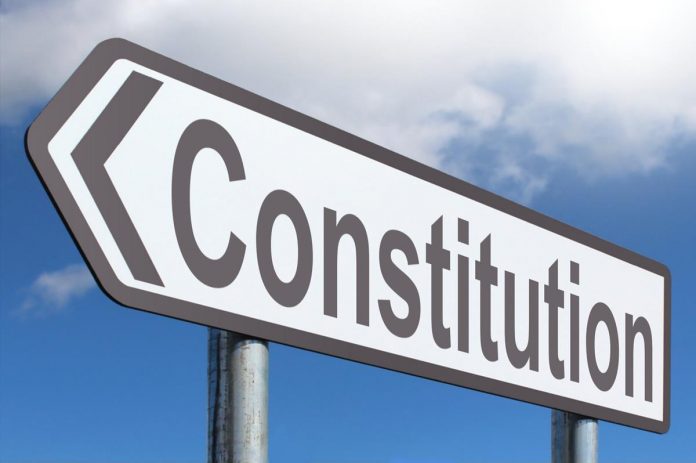This article is written by Mrinal Mukul, a student at O.P Jindal Global University, Haryana. This article talks about Article 164 of the Indian Constitution in context of the State Executive.
It has been published by Rachit Garg.
Table of Contents
Introduction
The Constitution is the supreme law of India. It sets out a framework for defining political principles, establishes the basic structure, procedures, powers, and responsibilities of government agencies, and establishes citizens’ basic rights, duties, and obligations. India has 28 states and 8 union territories (including Jammu and Kashmir after Article 370 was repealed). Every state has a Chief Minister, who is appointed by the governor.
Article 164 deals with state legislatures and elections to the Parliament. It provides a unified voter role for elections to the Parliament and the Legislature of every state. It stipulates that a member of Parliament can only be elected from one Parliament or parliamentary constituency. Article 164 is that part of the Constitution of India which contains the constitutional directives governing the Federal Government (Centre) and its territorial divisions: States and Union Territories.
In essence, Article 164 of the Indian Constitution focuses on the appointment of the Chief Minister and Council of Ministers in India. Furthermore, it focuses on the oath-taking of the ministers and, in certain cases, the appointment of non-members of the legislative assembly into the Council of Ministers.
Provisions under Article 164 of Indian Constitution
Article 164(1) : This clause deals with the provision of the appointment of Chief Minister and other members. However, here the Chief Minister will be appointed by the Governor, and other Ministers will be appointed by the Governor on the advice given by the Chief Minister, and the term of the Ministers may serve as the Governor wishes: provided that in Bihar, Madhya Pradesh, and Orissa, there have to be a Minister in charge responsible for tribal welfare, who may additionally be responsible for enlisted caste and backward class welfare or any other duties.
Article 164(1)(a) : mentions that a total number of ministers in a state shall not exceed 15% limit of the total number of ministers in the state.
Article 164(1)(b) : the Act was added by the 91st Amendment, which refers to the disqualification of the Minister of state.
Article 164(2) : The Council of Ministers is jointly accountable to the Legislative Assembly of the State.
Article 164(3) : Before the Minister takes office, the Governor shall administer to him the oaths of the concerned office and of secretary based on the forms set out for this purpose in the Third Schedule.
Article 164(4) : This clause deals with the provision which states that a minister who has not been a member of the state legislature for six consecutive months will cease to be a minister at the end of that period.
Article 164(5) The salaries and allowances of the Minister shall be determined by law from time to time by the State Legislature, and until the legislature of the state so determines, shall be as set forth in the Second Schedule.
Article 164 : oath and affirmation by members
Every member of the State Council and every member of the House of People should, before taking his/her seat, take an oath and sign an oath or undertaking in the form laid down by the President or a person designated by the President. An oath and affirmation must be made in the form set out by the Third Schedule.
Article 164(4) deals with the provision which states that if there is no such person as the Chief Minister, the Prime Minister will hold office until a new Chief Minister is appointed. This occurs when the party’s majority members withdraw their support for a Chief Minister who does not have the backing of members of the parliamentary majority. This can be further supported by Article 75(5), which states that in the event of a new election, if the Minister is not elected as an Member of either house of Parliamnet within six months of taking office, he ceases to be a Minister. However, they will remain in office until a successor takes office. The Council of Ministers will be overall accountable to the State’s Legislative Assembly.
The article lays down a few crucial points: the qualifications for being chosen as a member of the parliament. The article also focuses on the exemption through Article 164(4) of the Indian Constitution that even though the elected one is not a member of the house, they can still hold the responsibility of the Chief Minister for a certain time period.
Circumstances in which Article 164 applies
Our Indian Constitution does not specifically mention the qualification to be appointed as Chief Minister. Article 164 states that the Chief Minister will be appointed by the Governor. Moreover, this does not mean that the Governor is free to appoint anyone as a Chief Minister of the state or Union Territories.
The words used in Article 164 give an impression that the Governor has ultimate authority over the State Government. For example, Article 164 states that a minister will hold office at the pleasure of the Governor. All this signifies that under Article 164, the Governor has immense power with regard to the subject matter.
Article 164 and Article 75 (5) of the Indian Constitution also mention that if a person who acts as a Prime Minister or Chief Minister, even when they are not MPs or MLAs, then in such situations, they must not be debarred from practicing any proceeding of the legislature during the period for which they act. Moreover, Article 164 also states the responsibilities and powers of the government’s executive branch.
Landmark judgments relating to Article 164 of Indian Constitution
Har Sharan Verma vs. Tribhuvan Narain Singh
In the case of Har Sharan Verma vs. Tribhuvan Narain Singh (1971), the Constitutional Division of the Supreme Court considered whether a person who is not a member of the state legislature can be appointed as Chief Minister or not? In this case, the appointment of Tribhuvan Narain Singh as Chief Minister of Uttar Pradesh was questioned on the grounds that he was not a member of either house of the Legislature when he was appointed. In the High Court, Har Sharan Verma claimed that Article 164(1) of the Constitution prohibits the appointment of non-legislators as Chief Minister. Rejecting this argument, the Allahabad High Court stated that a Chief Minister is like any other minister, and they can hold office for six months even if they are not a member of the Legislature.
SR Chaudhuri vs. State of Punjab
In the case of SR Chaudhuri vs. State of Punjab (2001), the Supreme Court, while interpreting Article 164, stated the law that the Constitutional provisions are required to be understood and elucidated through an object-oriented approach. A Constitution ought not to be understood in a narrow sense. The words used may be generic, but their full and true meaning must be understood, taking into account their real context and the purpose they are intended to serve. The Constituent Assembly debate mentioned earlier in the verdict made it clear that non-members entering the cabinet were considered valid only for six months, during which time members had to be elected, or they would no longer be ministers. An accepted view is that debates in the Constitutional Assembly can be used to help in interpreting constitutional provisions since it is the court’s job to determine the intent of the drafters. We must not forget that our Constitution is not just a document but a living framework for the government and its people, and its working depends upon the democratic spirit underlying it being respected in every form. The debate clearly shows that the privilege is to be extended only for six months.
B.R. Kapur vs. State of Tamil Nadu
In another landmark case which was stated in B.R. Kapur vs. State of Tamil Nadu (2001), the majority of judges, while discussing the issue of a writ of quo warranto, ruled that if a non-legislator could be appointed as a Chief Minister under Article 164 of the Indian Constitution, then they must fulfil the qualification of membership of a legislator as mentioned under Article 173 of the Indian Constitution.
Recent instances of Article 164 of Indian Constitution which were in the news
The most recent instance happened in the West Bengal election when Mamata Banerjee lost the assembly election in Nandigram to Suvendu Adhikari (BJP candidate). She said she would challenge this and could still be a West Bengal Chief Minister. Under Article 164 of the Constitution, it states certain conditions for taking an oath as a minister. However, Article 164(4) says that a minister who has not been a member of the state legislature for six consecutive months will cease to be a minister at the end of that period. All this means that Mamta Banerjee will have six months to get formally elected from any Bengal constituency in a by-poll to hold on to a Chief Minister’s chair. Even in 2011, for the very first time when Mamta Banerjee took oath as a Chief Minister, she was a member of Parliament as she didn’t contest the assembly election. However, after months, Mamta Banerjee was elected from Bhabanipur.
Conclusion
The paper sets out the requirements for electing members of the state legislatures. The paper also provides an exception to Article 164(4) that they may hold the official roles and duties of the Chief Minister even when they are not members of the House of Representatives. Additionally, Article 164 is important to understand the powers of the executive branch and the extent of the governor’s discretion in this context. Article 164 also deals with the appointment, tenure, duties, qualifications, oaths, salaries and allowances of the Minister.
Frequently Asked Questions (FAQs)
1. Who was the first Chief Minister of India?
The first Chief Minister of India was Govind Ballabh Pant.
2. Which Article mentions about the Chief Minister?
Article 164 talks about the appointment of the Chief Minister and other ministers.
3. Why, Article 164 been in the news recently?
Article 164 has been in the news because in West Bengal, Mamta Banerjee will have to win the election in the next six months to be Chief Minister.
4. What does Article 164(4) talk about?
A minister who has not been a member of the state legislature for six consecutive months will cease to be a minister at the end of that period.
5. What is the purpose behind Article 164(4)?
Article 164 (4) and 75(5) also provide that a person who is a Chief Minister or Prime Minister, although not an MLA or MP, shall not be prohibited from participating in the proceedings of any legislature during the tenure for which they act as such.
6. Who appoints the Chief Minister?
The Chief Minister is appointed by the Governor, who also appoints other ministers on the advice of the Chief Minister.
References
- https://blog.ipleaders.in/analysis-article-75-article-164-indian-constitution/
- https://legodesk.com/legopedia/article-164/
- https://indiankanoon.org/doc/578636/
- https://byjusexamprep.com/current-affairs/article-164
- https://www.jagranjosh.com/general-knowledge/chief-minister-in-india-1437624804-1https://www.newindianexpress.com/states/tamil-nadu/2018/jul/01/was-tamil-nadu-raj-
- bhavans-legal-opinion-on-governors-direct-meetings-with-officials-right-1836307.html
- https://www.casemine.com/search/in/article%20164%20of%20the%20constitution
- https://www.siasat.com/can-a-person-who-lost-election-be-appointed-as-chief-minister-2132476/
Students of Lawsikho courses regularly produce writing assignments and work on practical exercises as a part of their coursework and develop themselves in real-life practical skills.
LawSikho has created a telegram group for exchanging legal knowledge, referrals, and various opportunities. You can click on this link and join:
Follow us on Instagram and subscribe to our YouTube channel for more amazing legal content.
 Serato DJ Crack 2025Serato DJ PRO Crack
Serato DJ Crack 2025Serato DJ PRO Crack











 Allow notifications
Allow notifications


